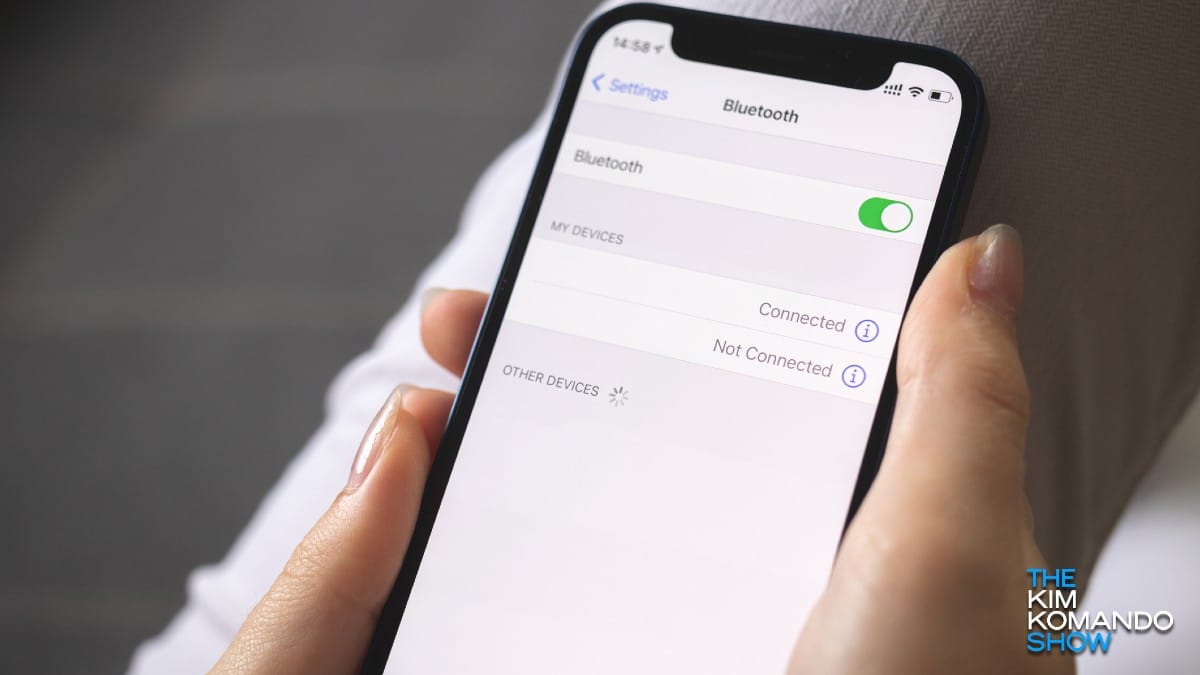YouTube car-crashing duo arrested, Amazon Sidewalk network’s security risks. Plus, Amazon’s latest feature alerts you about frequently returned items. I show you how your smartphone can be a lifesaver. Also, TikTok’s strange warning about Fruit Roll-Ups (Hint: It’s about plastic). Matt explores the weirdest and best subreddits. Allie shares some effortless ways to make money from the comfort of your couch — no hair brushing required.
Don't be a victim: Leaving your phone's Bluetooth on is a major security risk

Keeping yourself safe from creeps and hackers is a big job, but certain habits make it easier.
Here’s a simple one: Stop giving your phone number to every place that asks for it. Read this tip about the best ways to hide your phone number and email address for help.
Another smart step is regularly checking your most important accounts. Use Google? Start here.
Here’s a mistake I bet you didn’t know you were making: Leaving your smartphone’s Bluetooth switched on 24/7.
Bluetooth is everywhere
Bluetooth is a short-range wireless radio technology that allows different devices to communicate with each other. You’ll find the tech in cars, speakers, TVs, headphones, keyboards, mice, printers and more.
It works similarly to Wi-Fi and cellular networks but performs simpler tasks at shorter ranges. You don’t need a cellular signal or network connection to use Bluetooth, and it doesn’t use data.
You’ll find the tech baked into almost every smartphone you can buy nowadays. But as with a Wi-Fi network or other connection, Bluetooth has vulnerabilities.
Here’s how these attacks work
There are a few ways threat actors take advantage of Bluetooth-enabled devices:
- They send spam messages and malicious links to trick you into providing personal information or downloading malware.
- Hackers connect to your phone and install malware or backdoor access. Then, they listen in on your conversations, read your messages and access your contacts. They are, in essence, bugging your phone.
- Cybercriminals retrieve information from your phone, such as call logs, photos and passwords and use it to commit identity theft or hold it for ransom.
Hackers and scammers must be close to you to use Bluetooth to hijack your phone. But in just about any public space, you’re arm’s length from strangers.
Can’t put your phone down? Here are tips to cut back on screen time

The more apps you have, the slower your phone runs and the more exposed you are to security risks. Tap or click here to run an app audit.
More apps lead to more time spent staring at our screens. Take a guess which country’s residents are most addicted to their phones? If you guessed the U.S., you’re wrong.
The top 3 reasons why your Wi-Fi sucks
Selling your home? Make sure you do this first
A virtual tour is a must for showing off your kitchen, living room, and garage on real estate sites. But if done wrong, it could expose you to serious security risks.
6 everyday objects that can threaten your cybersecurity

We have to worry about many forms of cyberattacks, from phishing to spyware. Since we know about these digital threats, we tend to be more careful online. However, you also have to defend against physical cybersecurity threats.
Popular antivirus broke Microsoft Edge - Here's how to fix it

Last year, there were nearly 2,000 reports of data breaches in the U.S., the highest number ever reported. That’s just one example of why it’s essential to keep your own devices safe from security risks.
That starts with a solid antivirus program for your computer and smartphone. Many free apps don’t have your best interest in mind and could be putting your device at risk. Tap or click here for free antivirus and cleaning apps you should delete.
Weirdest new devices, home selling danger, money tip
What’s in your toilet? A ton of data, apparently. Just connect this device to your iPhone — and then your toilet. Plus, a Mercedes-level stroller for babies, AI ovens, color-changing cars, 3D tours pose major security risks, how to make more money in the new year and my smart advice for callers like you.
Learn more about your ad choices. Visit megaphone.fm/adchoices
Best future car tech, virtual Santa visits, secret Instagram hack
Selling your home? You’ll need a big virtual tour — as long as you watch out for these security risks. Plus, this tech tool reveals whether a used car was in an accident and five ways to use an old iPhone or Android.
Learn more about your ad choices. Visit megaphone.fm/adchoices
Home sellers: 3D tours pose major security risks
Selling a home? You’ll want to know about virtual house tours. Listen to this one-minute podcast for all the security risks to watch out for.
Learn more about your ad choices. Visit megaphone.fm/adchoices
If you're prompted to update Flash Player, ignore it!

Millions have used the popular Flash software from Adobe over decades. But the technology was eventually killed off in 2020. One reason it went away is it posed many security risks. Microsoft even released a patch that forcefully removes it.
Apple just pulled down an app that helps you spot fake Amazon reviews - after Amazon asked

Across several online stores, fake reviews or paying people for a good word has become an increasing problem. The issue is prevalent on Amazon, where a dozen or so companies were recently caught in a “reviews for rewards” scheme.
Check this list! Android phones Google says are in danger of being hacked

There are so many different Android manufacturers it’s hard to keep track of them all. Some smartphones even have custom versions of the Android operating system — like Samsung’s Galaxy series. This makes it tough for Google to make consistent updates that fit every device.
Your Mac isn't as secure as you think - and hackers know it

Security risks have been around since the early days of the internet. Today, we have to watch for dangerous threats like ransomware, malware and spyware hiding around every corner.
We even told you about a nasty old-school virus making the rounds recently. Tap or click here to find out how to stop it from wiping out your files.